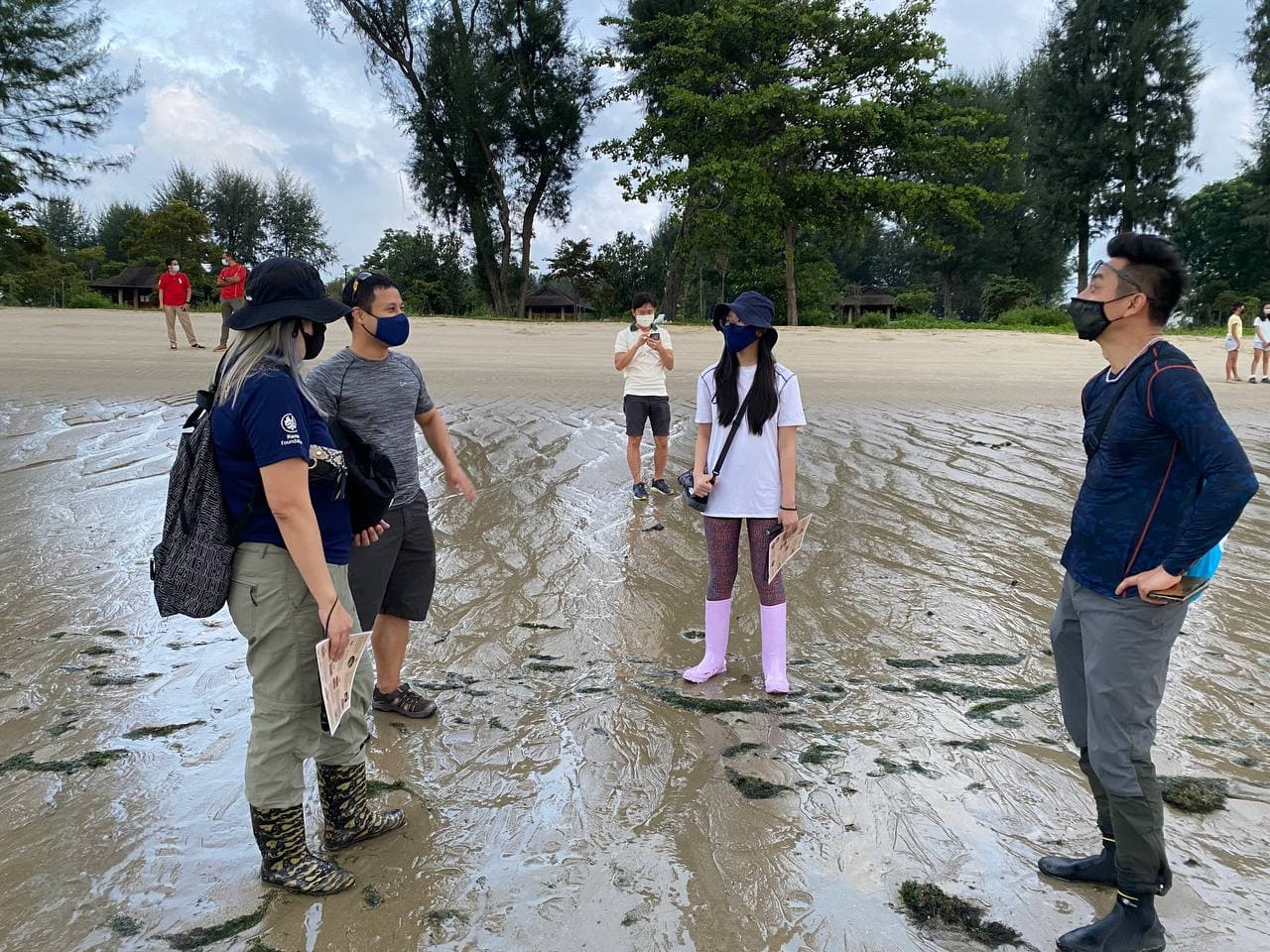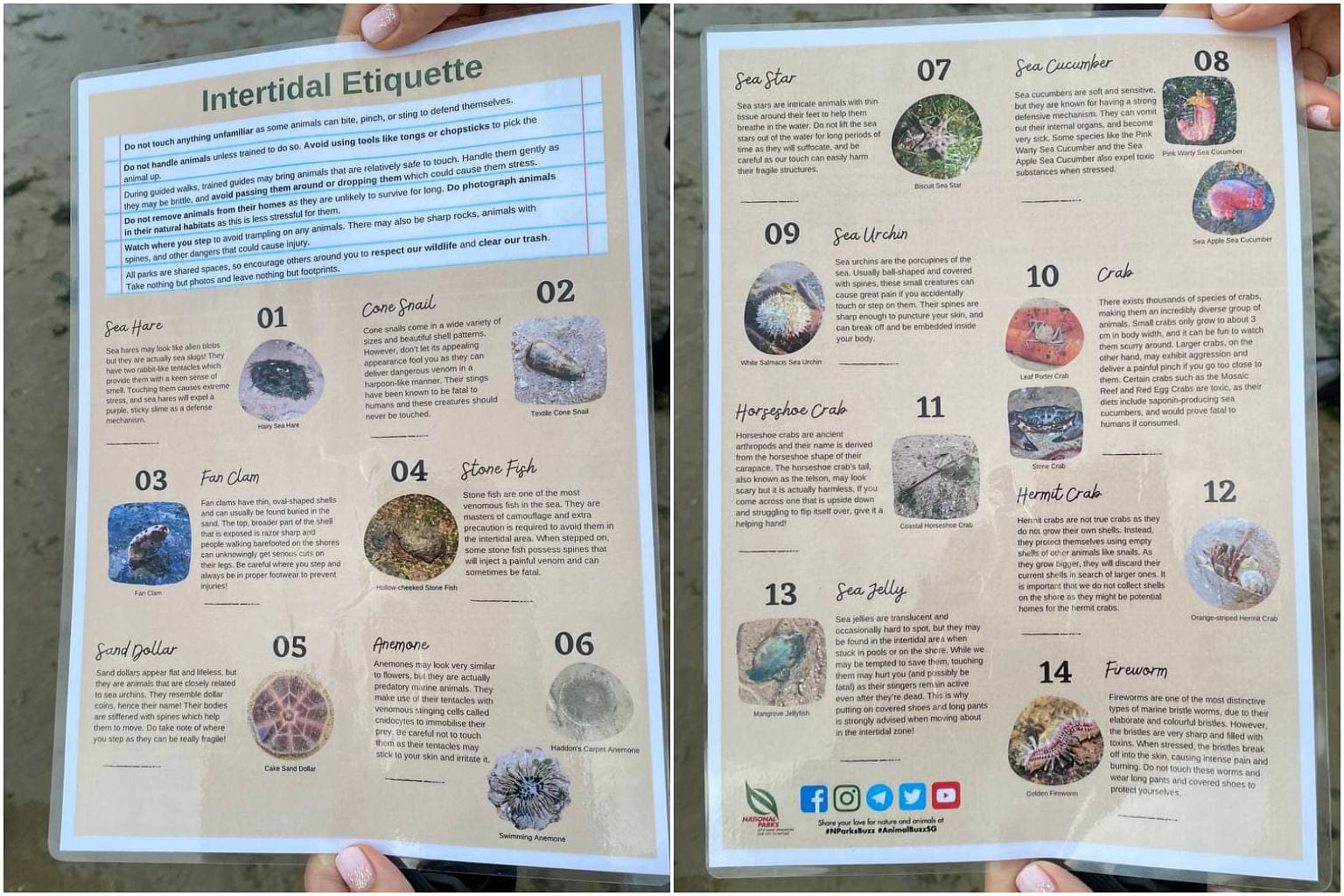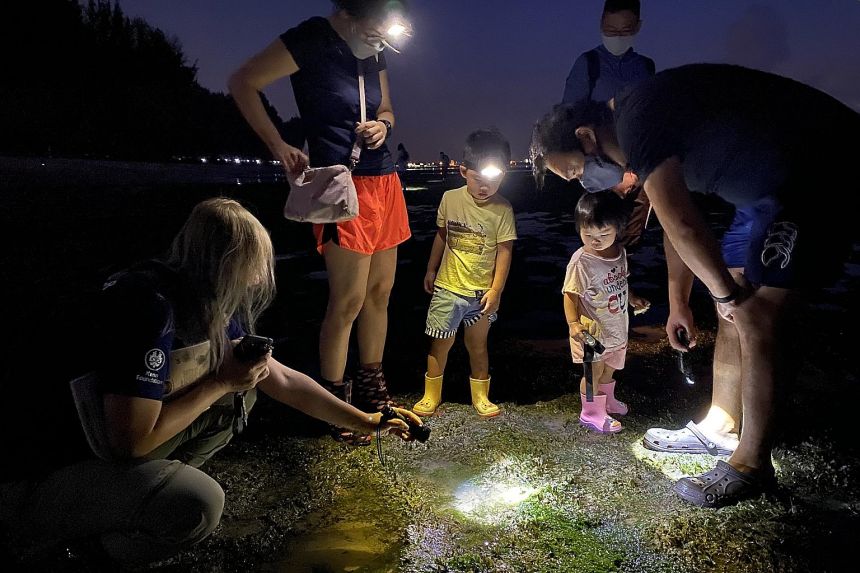NParks staff, volunteers promote good etiquette at Changi Beach at low tide
Sign up now: Get ST's newsletters delivered to your inbox

Minister for National Development Desmond Lee (second from left) talking to volunteers and beachgoers at Changi Beach on June 27, 2021.
ST PHOTO: AUDREY TAN
SINGAPORE - Dawn had not yet broken at 6am on Sunday (June 27) but people were already out on the mudflats of Changi Beach, exploring the area at low tide.
As they peered into tiny holes in the seabed and sought marine creatures among the blades of seagrass, volunteers and staff from the National Parks Board (NParks) kept a close watch.
"Just look, don't touch," Madam Doreen Foo, 44, one of the volunteer guides, was overheard reminding a family of four. She pointed out to them a cake sea star that had been exposed by the retreating waters. It was a rare find, she added.
Madam Foo, a marketing assistant manager, was among more than 50 people who volunteered with NParks to patrol the nation's accessible seashores over the weekend, to remind beachgoers not to handle marine life in a way that could be harmful.
About 70 NParks staff were also stationed at various locations to advise the public on intertidal etiquette and marine life conservation.
Patrols were also conducted in other places such as the beaches at Pasir Ris Park, East Coast Park and Sembawang Park.
Tides on Saturday and Sunday were low, exposing large tracts of the seafloor and their bounty: warty sea cucumbers, anemones, sea stars and many different types of crabs.
The patrols by NParks staff and volunteers come after crowds were seen flocking to the intertidal areas of Changi Beach, during the last low tide on June 13 that revealed large areas of the seashore. The crowds were armed with pails, shovels and tongs.
Posts circulating on social media showed families poking and digging up creatures such as anemones, crabs and jellyfish as well as placing them in buckets.
Touching marine creatures causes them unnecessary stress, and soft-bodied organisms could also get injured from being handled.
It was not immediately clear from the photographs and videos if the creatures were being harvested as seafood. Animals not typically consumed, such as sea anemones, were also seen in the buckets.
Other than certain rare species, such as giant clams, invertebrates - marine and land creatures without backbones, including shellfish and crabs - are not protected under the Wildlife Act.
The Act, which came into effect last year, is meant to extend greater protection to Singapore's native wildlife.
NParks later said that it would be taking extra steps to prevent beachgoers from manhandling marine creatures in intertidal areas, including putting up more signs and stepping up patrols by staff, volunteers and nature groups.

NParks said that it would be taking extra steps to prevent beachgoers from manhandling marine creatures in intertidal areas.
ST PHOTO: AUDREY TAN
The situation seemed to have improved this time round.
During the three-hour period on Sunday when the tides were low, The Straits Times saw only one couple at Changi Beach picking out marine creatures with a bucket and tongs.
Many others were observed practising good etiquette instead. Some, for instance, picked up trash as they walked along the exposed shoreline.
Punggol Primary School pupil Kayden Chan, 10, was seen with a fistful of discarded fishing hooks and lines. He said he had disentangled a crab trapped in a hook and line, and held onto the debris, picking up other items along the way.
"I enjoy seeing the sea animals," he added. "But my favourite is the crab because it can go sideways."
It was his first time to the intertidal areas, said his mother Wendy Chan, 42. The housewife added that she was aware of the previous incident in which people were seen digging out marine life. "As much as we are curious, we should just take pictures and try not to touch them," she added.

She noted that the guides helped to make the lessons come alive for the children.
Teacher Nazurah Omar, 36, so loved exploring the intertidal areas of Changi with her husband and daughter on Saturday that they went again on Sunday.
"My husband usually doesn't like nature walks. But after we came yesterday, he was impressed with the nature that we have here. He thought that such wildlife can only be found overseas," she said.
Dr Karenne Tun, director at NParks' National Biodiversity Centre, said the board is working on an outreach plan to raise awareness on the detrimental effects of touching, collecting or trampling on marine wildlife in their natural habitats, leveraging on the support of a growing volunteer community.
She added: "We also encourage the public to join us in helping to conserve our marine habitats by participating in our intertidal watch citizen science programme."
Minister for National Development Desmond Lee was also at Changi Beach on Sunday, interacting with beachgoers and volunteers.

ST PHOTO: AUDREY TAN
Speaking to ST, he said he is aware that many Singaporeans are exploring different parts of the country during the Covid-19 pandemic.
"In recent weeks, there has been some news about some behaviours that resulted in some of our habitats being affected adversely," he added.
There are two ways to approach this, he said. One is to close areas off and stop people from visiting sensitive habitats and prohibit certain behaviours.
"But we prefer a balanced approach, including public education… galvanising our volunteers, our community, to reach out to Singaporeans who are maybe for the first time exploring natural areas of Singapore," said Mr Lee.
"We hope this is a window of opportunity, instead of one where people get turned off from visiting natural areas," he added.
"So please come properly attired, be safe, enjoy and marvel at the rich biodiversity that urban Singapore has to offer. Because we are a City in Nature after all."


